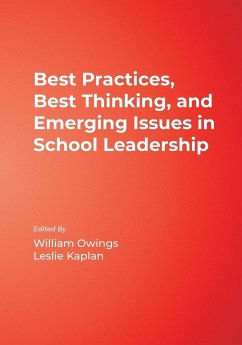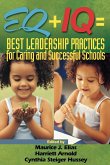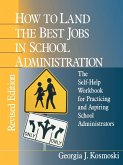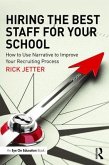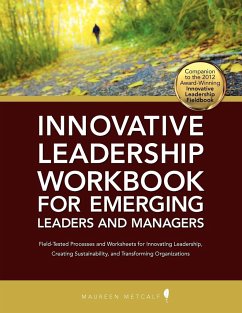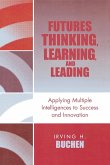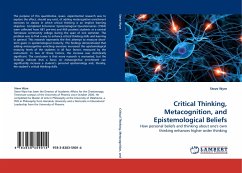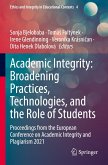William Owings, Leslie Kaplan
Best Practices, Best Thinking, and Emerging Issues in School Leadership
William Owings, Leslie Kaplan
Best Practices, Best Thinking, and Emerging Issues in School Leadership
- Broschiertes Buch
- Merkliste
- Auf die Merkliste
- Bewerten Bewerten
- Teilen
- Produkt teilen
- Produkterinnerung
- Produkterinnerung
Featuring the leading figures in educational leadership, this resource presents research and key considerations to assist in making decisions about new programs and directions for your school.
Andere Kunden interessierten sich auch für
![Eq + IQ = Best Leadership Practices for Caring and Successful Schools Eq + IQ = Best Leadership Practices for Caring and Successful Schools]() Elaine K. McEwanEq + IQ = Best Leadership Practices for Caring and Successful Schools36,99 €
Elaine K. McEwanEq + IQ = Best Leadership Practices for Caring and Successful Schools36,99 €![How to Land the Best Jobs in School Administration How to Land the Best Jobs in School Administration]() Georgia J. KosmoskiHow to Land the Best Jobs in School Administration31,99 €
Georgia J. KosmoskiHow to Land the Best Jobs in School Administration31,99 €![Hiring the Best Staff for Your School Hiring the Best Staff for Your School]() Rick JetterHiring the Best Staff for Your School41,99 €
Rick JetterHiring the Best Staff for Your School41,99 €![Innovative Leadership Workbook for Emerging Managers and Leaders Innovative Leadership Workbook for Emerging Managers and Leaders]() Maureen MetcalfInnovative Leadership Workbook for Emerging Managers and Leaders38,99 €
Maureen MetcalfInnovative Leadership Workbook for Emerging Managers and Leaders38,99 €![Futures Thinking, Learning, and Leading Futures Thinking, Learning, and Leading]() Irving H. BuchenFutures Thinking, Learning, and Leading62,99 €
Irving H. BuchenFutures Thinking, Learning, and Leading62,99 €![Critical Thinking, Metacognition, and Epistemological Beliefs Critical Thinking, Metacognition, and Epistemological Beliefs]() Steve WyreCritical Thinking, Metacognition, and Epistemological Beliefs44,99 €
Steve WyreCritical Thinking, Metacognition, and Epistemological Beliefs44,99 €![Academic Integrity: Broadening Practices, Technologies, and the Role of Students Academic Integrity: Broadening Practices, Technologies, and the Role of Students]() Academic Integrity: Broadening Practices, Technologies, and the Role of Students119,99 €
Academic Integrity: Broadening Practices, Technologies, and the Role of Students119,99 €-
-
-
Featuring the leading figures in educational leadership, this resource presents research and key considerations to assist in making decisions about new programs and directions for your school.
Produktdetails
- Produktdetails
- Verlag: Corwin
- Seitenzahl: 306
- Erscheinungstermin: 23. Januar 2003
- Englisch
- Abmessung: 254mm x 178mm x 17mm
- Gewicht: 579g
- ISBN-13: 9780761978633
- ISBN-10: 0761978631
- Artikelnr.: 21410662
- Herstellerkennzeichnung
- Libri GmbH
- Europaallee 1
- 36244 Bad Hersfeld
- gpsr@libri.de
- Verlag: Corwin
- Seitenzahl: 306
- Erscheinungstermin: 23. Januar 2003
- Englisch
- Abmessung: 254mm x 178mm x 17mm
- Gewicht: 579g
- ISBN-13: 9780761978633
- ISBN-10: 0761978631
- Artikelnr.: 21410662
- Herstellerkennzeichnung
- Libri GmbH
- Europaallee 1
- 36244 Bad Hersfeld
- gpsr@libri.de
William A. Owings, Ed.D. is currently a professor of educational leadership at Old Dominion University in Norfolk, VA. Owings has worked as a public school teacher, an elementary and high school principal, assistant superintendent, and superintendent of schools. His professional interests are in school finance, principal quality, and teacher quality as they relate to school improvement and student achievement. In addition, his scholarly publications co-authored with Leslie Kaplan include articles in National Association of Secondary School Principals (NASSP) Bulletin, Journal of School Leadership, Journal of Education Finance, Journal of Effective Schools, Phi Delta Kappan, and the Teachers College Record. Owings has served on the state and international board of the Association for Supervision and Curriculum Development (ASCD), is currently the editor of the Journal for Effective Schools, and is on the Journal of Education Finance Editorial Advisory Board. He is a frequent presenter at state and national conferences and a consultant on educational leadership, school finance, and instructional improvement. Owings and Kaplan share the 2008 Virginia Educational Research Association Charles Edgar Clear Research Award for Consistent and Substantial Contributions to Educational Research and Scholarship. http: //www.ejbe.org/EJBE2012Vol05No10p45OWINGS-KAPLAN-PIRIM.pdf http: //issuu.com/odujes/docs/journal_for_effective_schools/1?mode=a_p http: //www.effectiveschoolsjournal.org/index.php?option=com_content&view=article&id=27&Itemid=72 http: //www.ejbe.org/EJBE-2012-Nov-5-10.htm Leslie S. Kaplan, Ed.D. is a retired school administrator in Newport News, VA and is currently a full-time education writer. She has provided middle and high school instructional and school improvement leadership as an assistant principal for instruction as well as central office leadership as a director of program development. Before becoming a school administrator, she worked as a middle and high school counselor, and these insights continue to infuse her leadership behaviors. Her professional interests focus on teacher quality, principal quality, and school finance and their relationship to school improvement and increasing student achievement. She has co-authored several books and monographs with William Owings including American Public School Finance (2nd edition); Educational Foundations (2nd edition); Leadership and Organizational Behavior in Education: Theory into Practice; The Effective Schools Movement: History, Analysis, and Application; Teacher Quality, Teaching Quality, and School Improvement; Best Practices, Best Thinking, and Emerging Issue in School Leadership; and Enhancing Teacher and Teaching Quality. Kaplan's scholarly publications, co-authored with Owings', appear in numerous peer-reviewed professional journals. Kaplan is co-editor of the Journal for Effective Schools, and also serves on the NASSP Bulletin Editorial Board. She is a past president of the Virginia Counselors' Association and the Virginia Association for Supervision and Curriculum Development and presently sits on the board of Voices for Virginia's Children. http: //www.ejbe.org/EJBE2012Vol05No10p45OWINGS-KAPLAN-PIRIM.pdf http: //issuu.com/odujes/docs/journal_for_effective_schools/1?mode=a_p http: //www.effectiveschoolsjournal.org/index.php?option=com_content&view=article&id=27&Itemid=72 http: //www.ejbe.org/EJBE-2012-Nov-5-10.htm
Prologue - William A. Owings and Leslie S. Kaplan
A Brief Look at the ISLLC Standards
About the Editors
About the Contributors
Part I: Understanding Schools and School Leadership
1. Changing Demographics: A Call for Leadership - Harold L. Hodgkinson
ISLLC Questions
References
2. Media and Political Misrepresentation of Public Education - Gerald W.
Bracey
ISLLC Questions
References
Lessons Learned
Part II: Leading Change
3. Implementing Change at the Building Level - Michael Fullan
ISLLC Questions
References
4. Challenges to Leading and Sustaining School Change - William Patterson
ISLLC Questions
5. The New Effective Schools - Gordon Cawelti
ISLLC Questions
References
6. Politics and Education: A Conundrum for School Leadership - Gerald N.
Tirozzi
ISLLC Questions
References
Lessons Learned
Part III: Teaching and Learning
7. Curriculum and Instruction: Critical and Emerging Issues for Educational
Leadership - Robert J. Marzano
ISLLC Questions
References
8. Enhancing Teaching - Linda Darling-Hammond
ISLLC Questions
References
9. Teacher Quality - Thomas S. Mawhinny and Laura L. Sagan
ISLLC Questions
References
10. Using Technology to Change School Learning Culture - Alan November
ISLLC Questions
Reference
11. Integrating Technology Into Instructional Design - Frank M. Betts
ISLLC Questions
Annotated References
12. Professional Development in Instructional Technology: A Case Study -
Richard W. Shelly
ISSLC Questions
Lessons Learned
Reference
Part IV: Meeting Individual Learners¿ Needs
13. What Instructional Leaders Need to Know About Special Education -
Chriss Walther-Thomas and Michael F. Di Paola
ISLLC Questions
References
14. Making Inclusion Work - Patricia Jordan Rea
ISLLC Questions
References
15. Talent Development With English Language Learners - Nora G. Friedman
ISLLC Questions
References
16. Connecting Authentic Knowledge and Academic Accountability Through
Personal Learning Plans - Kelly Clarke/Keefe, Patricia Morgan and Susan
Brody Hasazi
ISLLC Questions
References
17. Severely and Profoundly Disabled Students in the School Community -
Phyllis Milne
ISLLC Questions
18. Working With Special Education Advocates - Marguerite A. Pittman
ISLLC Questions
19. Technology and Gifted Learners - Sandra L. Berger
ISLLC Questions
References
Lessons Learned
Part V: Accountability
20. High-Stakes Testing - Ronald S. Brandt
ISLLC Questions
21. Are Standards the Answer? - Linda Nathan
ISLLC Questions
22. Critical Issues in School Law - Jennifer A. Sughrue and M. David
Alexander
ISLLC Questions
23. Emerging Issues in Special Education Law - Kathleen S. Mehfoud
ISLLC Questions
24. Sustaining the Investment: Technology or Teachers? - Kenneth A.
Engebretson
Lessons Learned
Part VI: Future Trends in Education
25. Changes in Educational Practice - Gene R. Carter
ISLLC Questions
References
26. Changes in the Educational Landscape - Paul D. Houston
ISLLC Questions
Lessons Learned
Epilogue - Leslie S. Kaplan and William A. Owings
Index
A Brief Look at the ISLLC Standards
About the Editors
About the Contributors
Part I: Understanding Schools and School Leadership
1. Changing Demographics: A Call for Leadership - Harold L. Hodgkinson
ISLLC Questions
References
2. Media and Political Misrepresentation of Public Education - Gerald W.
Bracey
ISLLC Questions
References
Lessons Learned
Part II: Leading Change
3. Implementing Change at the Building Level - Michael Fullan
ISLLC Questions
References
4. Challenges to Leading and Sustaining School Change - William Patterson
ISLLC Questions
5. The New Effective Schools - Gordon Cawelti
ISLLC Questions
References
6. Politics and Education: A Conundrum for School Leadership - Gerald N.
Tirozzi
ISLLC Questions
References
Lessons Learned
Part III: Teaching and Learning
7. Curriculum and Instruction: Critical and Emerging Issues for Educational
Leadership - Robert J. Marzano
ISLLC Questions
References
8. Enhancing Teaching - Linda Darling-Hammond
ISLLC Questions
References
9. Teacher Quality - Thomas S. Mawhinny and Laura L. Sagan
ISLLC Questions
References
10. Using Technology to Change School Learning Culture - Alan November
ISLLC Questions
Reference
11. Integrating Technology Into Instructional Design - Frank M. Betts
ISLLC Questions
Annotated References
12. Professional Development in Instructional Technology: A Case Study -
Richard W. Shelly
ISSLC Questions
Lessons Learned
Reference
Part IV: Meeting Individual Learners¿ Needs
13. What Instructional Leaders Need to Know About Special Education -
Chriss Walther-Thomas and Michael F. Di Paola
ISLLC Questions
References
14. Making Inclusion Work - Patricia Jordan Rea
ISLLC Questions
References
15. Talent Development With English Language Learners - Nora G. Friedman
ISLLC Questions
References
16. Connecting Authentic Knowledge and Academic Accountability Through
Personal Learning Plans - Kelly Clarke/Keefe, Patricia Morgan and Susan
Brody Hasazi
ISLLC Questions
References
17. Severely and Profoundly Disabled Students in the School Community -
Phyllis Milne
ISLLC Questions
18. Working With Special Education Advocates - Marguerite A. Pittman
ISLLC Questions
19. Technology and Gifted Learners - Sandra L. Berger
ISLLC Questions
References
Lessons Learned
Part V: Accountability
20. High-Stakes Testing - Ronald S. Brandt
ISLLC Questions
21. Are Standards the Answer? - Linda Nathan
ISLLC Questions
22. Critical Issues in School Law - Jennifer A. Sughrue and M. David
Alexander
ISLLC Questions
23. Emerging Issues in Special Education Law - Kathleen S. Mehfoud
ISLLC Questions
24. Sustaining the Investment: Technology or Teachers? - Kenneth A.
Engebretson
Lessons Learned
Part VI: Future Trends in Education
25. Changes in Educational Practice - Gene R. Carter
ISLLC Questions
References
26. Changes in the Educational Landscape - Paul D. Houston
ISLLC Questions
Lessons Learned
Epilogue - Leslie S. Kaplan and William A. Owings
Index
Prologue - William A. Owings and Leslie S. Kaplan
A Brief Look at the ISLLC Standards
About the Editors
About the Contributors
Part I: Understanding Schools and School Leadership
1. Changing Demographics: A Call for Leadership - Harold L. Hodgkinson
ISLLC Questions
References
2. Media and Political Misrepresentation of Public Education - Gerald W.
Bracey
ISLLC Questions
References
Lessons Learned
Part II: Leading Change
3. Implementing Change at the Building Level - Michael Fullan
ISLLC Questions
References
4. Challenges to Leading and Sustaining School Change - William Patterson
ISLLC Questions
5. The New Effective Schools - Gordon Cawelti
ISLLC Questions
References
6. Politics and Education: A Conundrum for School Leadership - Gerald N.
Tirozzi
ISLLC Questions
References
Lessons Learned
Part III: Teaching and Learning
7. Curriculum and Instruction: Critical and Emerging Issues for Educational
Leadership - Robert J. Marzano
ISLLC Questions
References
8. Enhancing Teaching - Linda Darling-Hammond
ISLLC Questions
References
9. Teacher Quality - Thomas S. Mawhinny and Laura L. Sagan
ISLLC Questions
References
10. Using Technology to Change School Learning Culture - Alan November
ISLLC Questions
Reference
11. Integrating Technology Into Instructional Design - Frank M. Betts
ISLLC Questions
Annotated References
12. Professional Development in Instructional Technology: A Case Study -
Richard W. Shelly
ISSLC Questions
Lessons Learned
Reference
Part IV: Meeting Individual Learners¿ Needs
13. What Instructional Leaders Need to Know About Special Education -
Chriss Walther-Thomas and Michael F. Di Paola
ISLLC Questions
References
14. Making Inclusion Work - Patricia Jordan Rea
ISLLC Questions
References
15. Talent Development With English Language Learners - Nora G. Friedman
ISLLC Questions
References
16. Connecting Authentic Knowledge and Academic Accountability Through
Personal Learning Plans - Kelly Clarke/Keefe, Patricia Morgan and Susan
Brody Hasazi
ISLLC Questions
References
17. Severely and Profoundly Disabled Students in the School Community -
Phyllis Milne
ISLLC Questions
18. Working With Special Education Advocates - Marguerite A. Pittman
ISLLC Questions
19. Technology and Gifted Learners - Sandra L. Berger
ISLLC Questions
References
Lessons Learned
Part V: Accountability
20. High-Stakes Testing - Ronald S. Brandt
ISLLC Questions
21. Are Standards the Answer? - Linda Nathan
ISLLC Questions
22. Critical Issues in School Law - Jennifer A. Sughrue and M. David
Alexander
ISLLC Questions
23. Emerging Issues in Special Education Law - Kathleen S. Mehfoud
ISLLC Questions
24. Sustaining the Investment: Technology or Teachers? - Kenneth A.
Engebretson
Lessons Learned
Part VI: Future Trends in Education
25. Changes in Educational Practice - Gene R. Carter
ISLLC Questions
References
26. Changes in the Educational Landscape - Paul D. Houston
ISLLC Questions
Lessons Learned
Epilogue - Leslie S. Kaplan and William A. Owings
Index
A Brief Look at the ISLLC Standards
About the Editors
About the Contributors
Part I: Understanding Schools and School Leadership
1. Changing Demographics: A Call for Leadership - Harold L. Hodgkinson
ISLLC Questions
References
2. Media and Political Misrepresentation of Public Education - Gerald W.
Bracey
ISLLC Questions
References
Lessons Learned
Part II: Leading Change
3. Implementing Change at the Building Level - Michael Fullan
ISLLC Questions
References
4. Challenges to Leading and Sustaining School Change - William Patterson
ISLLC Questions
5. The New Effective Schools - Gordon Cawelti
ISLLC Questions
References
6. Politics and Education: A Conundrum for School Leadership - Gerald N.
Tirozzi
ISLLC Questions
References
Lessons Learned
Part III: Teaching and Learning
7. Curriculum and Instruction: Critical and Emerging Issues for Educational
Leadership - Robert J. Marzano
ISLLC Questions
References
8. Enhancing Teaching - Linda Darling-Hammond
ISLLC Questions
References
9. Teacher Quality - Thomas S. Mawhinny and Laura L. Sagan
ISLLC Questions
References
10. Using Technology to Change School Learning Culture - Alan November
ISLLC Questions
Reference
11. Integrating Technology Into Instructional Design - Frank M. Betts
ISLLC Questions
Annotated References
12. Professional Development in Instructional Technology: A Case Study -
Richard W. Shelly
ISSLC Questions
Lessons Learned
Reference
Part IV: Meeting Individual Learners¿ Needs
13. What Instructional Leaders Need to Know About Special Education -
Chriss Walther-Thomas and Michael F. Di Paola
ISLLC Questions
References
14. Making Inclusion Work - Patricia Jordan Rea
ISLLC Questions
References
15. Talent Development With English Language Learners - Nora G. Friedman
ISLLC Questions
References
16. Connecting Authentic Knowledge and Academic Accountability Through
Personal Learning Plans - Kelly Clarke/Keefe, Patricia Morgan and Susan
Brody Hasazi
ISLLC Questions
References
17. Severely and Profoundly Disabled Students in the School Community -
Phyllis Milne
ISLLC Questions
18. Working With Special Education Advocates - Marguerite A. Pittman
ISLLC Questions
19. Technology and Gifted Learners - Sandra L. Berger
ISLLC Questions
References
Lessons Learned
Part V: Accountability
20. High-Stakes Testing - Ronald S. Brandt
ISLLC Questions
21. Are Standards the Answer? - Linda Nathan
ISLLC Questions
22. Critical Issues in School Law - Jennifer A. Sughrue and M. David
Alexander
ISLLC Questions
23. Emerging Issues in Special Education Law - Kathleen S. Mehfoud
ISLLC Questions
24. Sustaining the Investment: Technology or Teachers? - Kenneth A.
Engebretson
Lessons Learned
Part VI: Future Trends in Education
25. Changes in Educational Practice - Gene R. Carter
ISLLC Questions
References
26. Changes in the Educational Landscape - Paul D. Houston
ISLLC Questions
Lessons Learned
Epilogue - Leslie S. Kaplan and William A. Owings
Index

